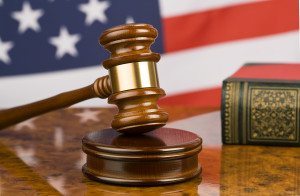 A patent attorney who was excluded from the USPTO has appealed to the Federal Circuit.
A patent attorney who was excluded from the USPTO has appealed to the Federal Circuit.
By way of background, on July 15, 2015, the USPTO Director entered an order excluding Richard Polidi from practice before the Office. The USPTO Director’s disciplinary action came after the Director of the Office of Enrollment and Discipline (OED) filed a complaint for reciprocal discipline predicated on Mr. Polidi’s disbarment from the State Bar of North Carolina.
Based on public documents filed in the North Carolina disciplinary matter, Mr. Polidi was admitted to the practice of law in 2004. In September 2012, Mr. Polidi received approximately $16,000 in connection with the representation of a client. According to the North Carolina disciplinary proceedings, at the time he received the funds, Mr. Polidi knew that his client had assigned the right to those funds to a third party. Instead of providing the funds to the third party, however, Mr. Polidi was found to haveused the $16,000 for his own personal benefit. This was allegedly done without the third-party’s authorization.
Mr. Polidi eventually transferred to the client an amount at least equal to the entrusted funds he had received in connection with the case. Based on these undisputed facts, the North Carolina court found as a matter of law that Mr. Polidi’s knowing misuse of third-party funds warranted disbarment from the North Carolina bar.
 In accordance with the USPTO’s disciplinary rules regarding reciprocal discipline codified in 37 C.F.R. § 11.24, Mr. Polidi was required to notify the Director of the Office of Enrollment and Discipline (OED) within thirty (30) days of his disbarment in North Carolina. It is not clear from the very limited records of disciplinary proceedings that are publicly available in the OED’s “FOIA Reading Room” whether Mr. Polidi provided the requisite notice.
In accordance with the USPTO’s disciplinary rules regarding reciprocal discipline codified in 37 C.F.R. § 11.24, Mr. Polidi was required to notify the Director of the Office of Enrollment and Discipline (OED) within thirty (30) days of his disbarment in North Carolina. It is not clear from the very limited records of disciplinary proceedings that are publicly available in the OED’s “FOIA Reading Room” whether Mr. Polidi provided the requisite notice.
In any event, the OED Director learned of Mr. Polidi’s disbarment and, as mandated by 37 C.F.R. § 11.24(a), he filed with the USPTO Director a complaint for reciprocal discipline predicated on the North Carolina disbarment.
The USPTO’s regulations mandate that whenever the OED Director learns that a patent or trademark attorney has been publicly disciplined on ethical grounds by another jurisdiction, the OED Director “shall” file with the USPTO Director a complaint for “reciprocal” discipline predicated on the discipline imposed by another jurisdiction. This process prohibits the publicly disciplined lawyer from re-trying issues or matters that were already decided in the other jurisdiction. Title 37, Section 11.24 further prohibits the USPTO Director or the OED Director from seeking to impose discipline that is greater than the discipline imposed by the other jurisdiction.
Whenever a patent or trademark attorney receives public discipline on ethical grounds by another jurisdiction, Section 11.24 dictates both the process to be followed and the maximum level of discipline the USPTO Director is permitted by law to impose. The mandatory process delineated in Section 11.24 provides predictability and notice for practitioners who are facing disciplinary charges in another jurisdiction and who are concerned how that other discipline may affect their right to practice before the USPTO. Indeed, since the USPTO first promulgated its rule on reciprocal discipline in September 2008, more than 80 practitioners have been reciprocally disciplined by the USPTO Director. In each one of those cases, the procedure set forth in Title 37, Section 11.24 was followed, and the USPTO Director imposed discipline that was identical to the discipline imposed in the other jurisdiction.
Under the rules of reciprocal discipline, the USPTO does not re-try the other jurisdiction’s disciplinary action and its review is extremely limited. Specifically, pursuant to 37 C.F.R. § 11.24(d), Mr. Polidi had the burden of presenting clear and convincing evidence that a disbarment was not appropriate based on one or more of the following factors:
The procedure in North Carolina was so lacking in notice or opportunity to be heard as to constitute a deprivation of due process;
There was such infirmity of proof establishing the conduct as to give rise to the clear conviction that the Office could not, consistently with its duty, accept as final the conclusion on that subject; or
The imposition of the same discipline would result in grave injustice.
According to the USPTO’s decision,
After receiving the Notice and Order, Respondent sought and received multiple extensions of time to respond to the Notice and Order. He also filed several requests that were in the nature of discovery requests; however, reciprocal matters in this current stage have a limited record and there is no opportunity for discovery, and so these requests were denied. See 37 C.F.R. § l l.24(b). In an order dated May 14, 2015, Respondent was notified that he was granted a final extension request and that he was required to respond to the Notice and Order on or before June 11, 2015, with no further extension to be provided absent extraordinary circumstances. Respondent has not filed a response to the Notice and Order. He was notified via email dated June 30, 2015 that no response had been received.
Thus, according to the USPTO’s decision, Mr. Polidi tried to obtain, and was denied access to, potentially exculpatory information from the USPTO. Evidently, the Agency took the position that Mr. Polidi was not entitled to such information. That said, nothing in the USPTO’s rules affirmatively prohibits the Agency from voluntarily producing potentially exculpatory information to the practitioner facing discipline.
The USPTO further ruled that since no response was received to the complaint for reciprocal discipline, and pursuant to the USPTO’s reciprocal discipline rule, the USPTO Director was required to impose the identical sanction imposed in North Carolina.
Under the USPTO’s rules, a disbarment is not necessarily permanent. Under the USPTO’s rules, an order of “exclusion” from the USPTO is treated as a five-year suspension. Consequently, reinstatement may be sought five years from the date when Mr. Polidi demonstrates to the OED his compliance with the duties of a suspended or excluded practitioner set forth in 37 C.F.R. Section 11.58.
Proceedings In The Eastern District of Virginia
In August 2015, Mr. Polidi filed a Petition for Judicial Review of the USPTO’s disciplinary decision. The Petition alleged that Mr. Polidi sought but was denied exculpatory evidence from the USPTO. According to the Petition, the solicitor prosecuting the case refused to disclose whether or not the USPTO was in possession of any such exculpatory information. According to the Petition, Mr. Polidi filed motions with the USPTO for production of such information, but his motions were denied.
According to the Petition, the prosecutor was ethically required to produce exculpatory evidence pursuant to the U.S. Supreme Court decision in Brady v. Maryland, 373 U.S. 83 (1974) as well the Virginia State Bar Rules of Professional Conduct. The Petition further alleged that the request for discovery was improperly denied and that the failure to produce such exculpatory evidence was an abuse of process, warranting reversal of the disciplinary order and a remand to the USPTO.
On November 24, 2015, the district court entered an Order denying the Petition. The court reasoned that Brady is, with limited exceptions that the court found inapplicable, only relevant to criminal prosecutions and is inapplicable to attorney disbarment proceedings. The district court further found that the attorney’s separate claim for violation of due process was duplicative of the claim raised based on Brady. Finally, the district court concluded that no discovery was permitted under USPTO regulations because the matter was not a “contested” case and that reciprocal discipline cases are not “contested” unless and until an answer is filed (which did not occur in this case).
Notably, the district court interpreted 37 C.F.R. Section 11.24 and held that the USPTO rules “require” imposition of reciprocal discipline. Thus, the court held based on the administrative record that no grounds existed warranting reversal of the USPTO’s exclusion order.
The district court’s decision was recently appealed by Mr. Polidi to the U.S. Court of Appeals for the Federal Circuit. Briefing on that matter is expected later this Spring.
In addition to the Petition, Mr. Polidi filed a complaint in the United States District Court for the Eastern District of Virginia against the USPTO Director and an individual non-USPTO employee. In his complaint, Mr. Polidi alleged that the USPTO failed to produce what he believed was potentially exculpatory evidence. According to the Petition:
In Proceeding No. D2015-11 of the United States Patent and Trademark Office (“‘USPTO”), the USPTO refused to disclose to the Plaintiff exculpatory information. Upon information and belief, the refusal was in contravention to not only Rule 3.8 of the Virginia State Bar Rules of Professional Conduct but the procedural and ethical obligations of attorneys who prosecute cases on behalf of the Virginia State Bar.
Upon information and belief, the duty of candor required of attorneys prosecuting ethics cases on behalf of the USPTO is no less than that of attorneys prosecuting ethics cases on behalf of the Virginia State Bar.
Upon information and belief, the USPTO violated additional Rules of Professional Conduct of the Virginia State Bar, as well as due process provisions of the United States Constitution.
Upon information and belief, the USPTO violated such regulations at least partly to prevent Plaintiff from learning of communications from Defendant Bell concerning Plaintiff, which communications influenced the entire proceeding against Plaintiff.
Upon information and belief, communications from Defendant Bell concerning Plaintiff were extremely misleading, dishonest, and fraudulent. They were made for the purpose of harassing Plaintiff and were made with malice. Neither the USPTO nor the NC Bar ever disclosed the communications to the Plaintiff, even though the communications substantially influenced the proceedings.
While the Plaintiff does not yet know the specifics of said communications, he has attempted several times to discover further details about them, to no avail.
The complaint alleged violations of 42 U.S.C. Section 1983 by the USPTO Director and a common law claim for malicious prosecution. The USPTO Director subsequently filed a motion in the district court to dismiss for lack of subject matter jurisdiction. The USPTO Director’s memorandum in support of motion to dismiss asserted:
This Court lacks jurisdiction over Polidi’s 42 U.S.C. § 1983 claim because the United States has not waived its sovereign immunity from suit. On its face, 42 U.S.C. § 1983 applies to those acting under color of state law, not those acting under color of federal law, such as federal agencies and employees in their official capacity. See Kotmair v. Gray, 505 F.2d 744, 745-746 (4th Cir. 1974). However, even if Polidi’s section 1983 claim were construed as a Bivens claim, such claims cannot be brought against federal agencies. FDIC v. Meyer, 510 U.S. 471, 485-86 (1994). In either instance, the Court lacks jurisdiction over Polidi’s section 1983 claim.
In January 2016, the district court granted Mr. Polidi’s motion to voluntarily dismiss the complaint. The dismissal was made without prejudice.
The appeal of the district court’s denial of Mr. Polidi’s Petition remains pending.